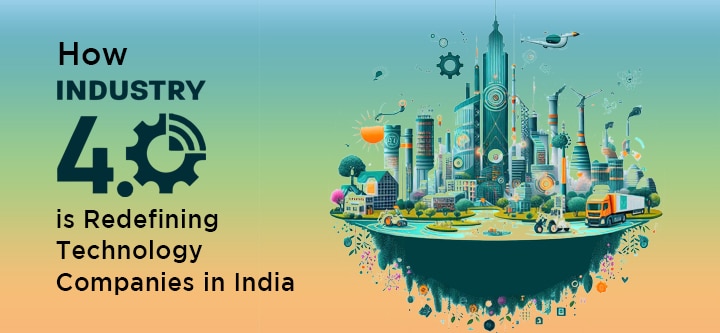Industry 4.0, heralded as the fourth industrial revolution, is transforming industries globally, with India emerging as a pivotal player in this evolution. Characterized by cutting-edge advancements in IoT (Internet of Things), AI (Artificial Intelligence), robotics, big data analytics, and cloud computing, Industry 4.0 is merging physical systems with the digital world.
For Indian technology companies, this revolution isn’t just about keeping pace—it’s about leading from the front. The integration of these technologies is enabling businesses to drive efficiency, foster innovation, and create sustainable solutions in an increasingly competitive landscape.
The Age of Smart Innovations
Industry 4.0 has unlocked new horizons for technological innovation. As of 2024, the global Industry 4.0 market is valued at approximately $250 billion and is projected to grow at a compound annual growth rate (CAGR) of 20% until 2030, according to Statista.
Indian companies are riding this wave by leveraging IoT, AI, and edge computing to deliver smarter products. For instance, IoT-enabled devices are revolutionizing healthcare, logistics and fintech, allowing real-time tracking and predictive analytics. A PwC India survey (2024) highlighted that 72% of Indian firms are investing in IoT to enhance operational efficiency and customer experience.
“Technological transformation is not just a necessity; it’s the cornerstone of success in the modern era,” noted Elon Musk, emphasizing the importance of embracing innovation.
Big Data, Bigger Insights
In a world dominated by data, Industry 4.0 ensures it is utilized to its fullest potential. With more than 60% of India’s population online as of 2024, companies are using big data analytics to gain actionable insights, streamline operations, and deliver personalized services.
According to a KPMG report (2024), 80% of tech leaders in India believe big data analytics has become integral to decision-making processes. Predictive analytics, a hallmark of Industry 4.0, is enabling firms to preempt challenges such as equipment downtime, supply chain disruptions, and fluctuating consumer demands.
Automation’s Golden Era
Automation is reshaping how industries operate, reducing human error, and enhancing productivity. By 2025, 40% of repetitive tasks in Indian industries are expected to be automated, according to McKinsey’s 2024 Global Automation Report.
From Robotic Process Automation (RPA) in financial services to AI-driven quality control in manufacturing, automation is paving the way for precision and speed. These advancements are particularly impactful in sectors like automotive and consumer goods where efficiency is paramount.
Greener and Smarter: Sustainability Meets Technology
Sustainability is no longer an afterthought—it’s a driving force for technological innovation. With India aiming to achieve net zero emissions by 2070, Industry 4.0 technologies are enabling businesses to reduce their environmental footprint.
Smart grids, energy-efficient manufacturing systems, and IoT-enabled monitoring tools are helping Indian companies optimize resource usage and minimize waste. A 2024 report by the International Energy Agency (IEA) states that adopting Industry 4.0 solutions could reduce industrial energy consumption by 20-30% globally, a transformative shift for energy-intensive industries in India.
Collaborative Synergies: Partnerships Driving Progress
The collaborative ethos of Industry 4.0 is evident in India’s growing tech ecosystem. Startups, large enterprises, academic institutions, and government initiatives are joining forces to innovate and deploy scalable solutions.
For instance, technology companies in India are partnering with global leaders to integrate AI into healthcare and education, improving accessibility and efficiency. The development of robust ecosystems ensures that no entity operates in silos, fostering a culture of collective growth.
Challenges on the Road to Transformation
While the promises of Industry 4.0 are immense, so are the challenges. A 2024 NASSCOM report revealed that 43% of Indian companies face skill shortages in implementing advanced technologies. Cybersecurity risks, high initial investment costs, and regulatory complexities also pose hurdles.
To counter these challenges, businesses are prioritizing upskilling programs, adopting robust cybersecurity frameworks, and working closely with policymakers to create conducive environments for innovation.
Industry 4.0 and the Evolute Impact
Evolute has embraced Industry 4.0 technologies to deliver innovative solutions in fintech and other sectors. By integrating IoT and AI into our products. Evolute is driving financial inclusion and streamlining operations, demonstrating the tangible benefits of this industrial revolution.
The Future of Industry 4.0 in India
As India’s technology sector continues to evolve, Industry 4.0 will remain at the heart of this transformation. With advancements in connectivity, data analytics, and automation, Indian firms are not just adapting to global standards but setting them.
Key Takeaways
- Innovation Explosion: IoT, AI, and edge computing are powering transformative products.
- Data Dominance: Big data analytics is reshaping industries with actionable insights.
- Automated Excellence: Robotics and automation are boosting precision and productivity.
- Sustainability Shift: Green technologies are aligning with India’s net-zero targets.
- Collaborative Ecosystems: Partnerships are fostering innovation and growth.
Industry 4.0 represents a seismic shift for technology companies in India. By harnessing its potential, businesses can create smarter, more sustainable solutions and position themselves as global leaders in this digital revolution.





